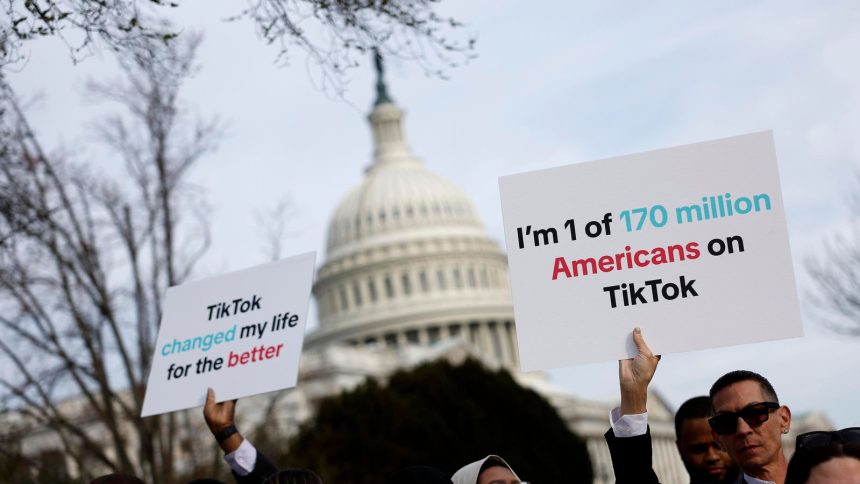The looming threat of a nationwide TikTok ban in the United States has sparked a flurry of interest from various entities, ranging from tech giants and seasoned investors to internet personalities and former government officials. This scramble to acquire the popular video-sharing app from its Chinese parent company, ByteDance, underscores the immense value of TikTok’s user base and its potential as a cultural and economic force. The potential ban, slated to take effect on January 19th, stems from longstanding concerns about TikTok’s data security practices and its perceived ties to the Chinese government. The Supreme Court’s impending decision on the ban’s legality has further intensified the pursuit of a potential sale.
Numerous parties have emerged as potential buyers, each with their own motivations and strategies. Elon Musk, CEO of Tesla and the world’s richest individual, has been mentioned as a possible candidate, with rumors circulating about discussions between Chinese officials and the incoming Trump administration exploring a potential sale to Musk. However, ByteDance has dismissed these reports as “pure fiction.” YouTuber MrBeast, known for his elaborate stunts and philanthropic endeavors, publicly expressed his interest in acquiring TikTok to prevent the ban and claimed to have been contacted by several billionaires regarding a potential partnership. This highlights the app’s appeal to a younger demographic and its potential as a platform for content creation and influencer marketing.
More formal proposals have also been submitted, including one from Project Liberty, an internet advocacy group led by billionaire Frank McCourt. Their proposal involves restructuring TikTok to minimize user data collection and boasts the backing of “Shark Tank” investor Kevin O’Leary and Guggenheim Securities. This approach emphasizes addressing the data privacy concerns that have fueled the push for a ban. Furthermore, former Treasury Secretary Steve Mnuchin has expressed his intentions to assemble a consortium to purchase TikTok, emphasizing the potential to recreate its algorithm – a key asset that ByteDance has reportedly been reluctant to include in any sale.
Other potential suitors include established corporations and industry figures. Amazon, a major advertiser on TikTok, has been suggested as a possible buyer due to its growing partnership with the platform, which allows users to browse and purchase Amazon products directly through the app. Rumble, a video-sharing platform, has also offered to buy TikTok, suggesting a potential consortium approach to finance the acquisition. Bobby Kotick, former CEO of Activision Blizzard, has reportedly explored the possibility of purchasing TikTok, potentially with the financial backing of OpenAI CEO Sam Altman. This reflects the strategic interest in TikTok’s potential for gaming integration and AI-driven content creation.
Past attempts to acquire TikTok have faced significant hurdles. Microsoft’s 2020 bid, described by CEO Satya Nadella as the “strangest thing I’ve ever worked on,” ultimately fell apart. A subsequent deal involving Oracle and Walmart also collapsed, reportedly due to concerns raised by the Biden administration regarding potential security risks. These failed attempts highlight the complex geopolitical and regulatory challenges involved in acquiring a Chinese-owned social media platform with a vast American user base.
The value of TikTok is estimated to be around $100 billion, according to Wedbush Securities analyst Dan Ives. This substantial valuation reflects the platform’s immense popularity, particularly among younger demographics, and its potential for further growth and monetization. The Supreme Court’s decision on the ban will have significant ramifications, either paving the way for a forced sale or potentially delaying the ban to allow for further legal proceedings. Solicitor General Elizabeth Prelogar has indicated the possibility of granting the court additional time to issue a ruling.
Underlying the entire debate are concerns surrounding TikTok’s data practices and its relationship with the Chinese government. Allegations of spying on journalists, promoting Chinese propaganda, mishandling user data (including sensitive financial information), and tracking user activity have fueled calls for greater scrutiny and regulation. TikTok and ByteDance have consistently denied these accusations, asserting their independence from the Chinese government and arguing that the proposed ban is technically and legally infeasible. However, these concerns remain central to the ongoing debate and will likely influence the Supreme Court’s decision and the future of TikTok in the United States.



